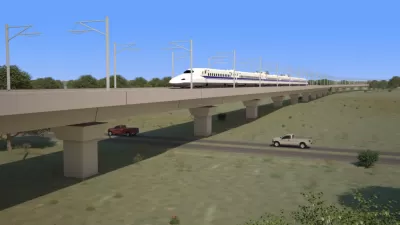The Dallas-to-Houston project will be the first operating high speed rail line in the United States when it opens in 2021. The project received $75 million in private funding, allowing planning for the project to advance.
Unlike the largely publicly funded and far more costlier California's high-speed rail project, the Texas project will be entirely privately funded*, which is why securing this $75 million is so significant.
As Planetizen noted last year, "securing the private financing is key to the project" known as the Texas Central High-Speed Railway (TCR) linking the 230 miles between the two most populous cities in the Lone State State in only 90 minutes. Houston and Dallas are also the fourth and ninth most populous cities in the United States, respectively, and among the fastest growing.
"The $75 million raised is more than the company sought for the first round of investments," writes Dylan Baddour for the Houston Chronicle. That money will allow the ambitious $10 billion project to move forward from feasibility studies to development planning.
The new CEO for the venture, Tim Keith, says "the rest will come through big private investment from private equity funds, large pension funds and large real estate and asset investors." That's Keith's specialty—his prior position was CEO of RREEF/Deutsche Bank Infrastructure Investments.
The Texas high-speed railway is planned to open in 2021. Should California's $68 billion high-speed rail project secure all its funding, it would open eight years later.
"The company has hit a few snags in acquiring the right of way along the path," writes Baddour. Eric Jaffe of CityLab goes into some depth on the opposition that has emerged]. "Some landowners decline to sell their plots, and eminent domain can be invoked to consolidate the path."
Indeed, in Texas one need not be a government entity to utilize eminent domain, "the power to take private property for public use following the payment of just compensation to the owner of that property," according to Legal Dictionary.
"Currently, hundreds of private firms have eminent domain authority in Texas, including pipeline companies, utility companies and telecommunication firms, wrote Aman Batheja of The Texas Tribune on April 8 about proposed legislation to strip TCR of that authority. "More than a dozen private railroad companies also have that authority, according to an unofficial list maintained by the state comptroller." However, Senate Bill 1601 hasn't advanced since May 11.
California Project
Acquiring private property for construction of the rail line in California's Central Valley has proven to be a time-consuming project, as Planetizen noted last year.
As for potential private investment, Tim Sheehan of the The Fresno Bee wrote on June 28 that while the California High-Speed Rail Authority "has about $6 billion available to build about 120-130 miles of the line in Fresno, Kings, Madera, Tulare and Kern counties — a combination of about $3 billion in federal stimulus and transportation funds and about $3 billion from Prop. 1A, the $9.9 billion high-speed rail bond measure approved by California voters in 2008...there is nary a private-sector dollar in sight."
Endnote on private TCR financing
FULL STORY: Texas high speed rail passes major milestone with first fundraising announcement

Trump Administration Could Effectively End Housing Voucher Program
Federal officials are eyeing major cuts to the Section 8 program that helps millions of low-income households pay rent.

Planetizen Federal Action Tracker
A weekly monitor of how Trump’s orders and actions are impacting planners and planning in America.

Canada vs. Kamala: Whose Liberal Housing Platform Comes Out on Top?
As Canada votes for a new Prime Minister, what can America learn from the leading liberal candidate of its neighbor to the north?

LA to Replace Inglewood Light Rail Project With Bus Shuttles
LA Metro says the change is in response to community engagement and that the new design will be ready before the 2028 Olympic Games.

Paris Voters Approve More Car-Free Streets
Paris Mayor Anne Hidalgo says the city will develop a plan to close 500 streets to car traffic and add new bike and pedestrian infrastructure after a referendum on the proposal passed with 66 percent of the vote.

Making Mobility More Inclusive
A new study highlights the challenges people with disabilities continue to face in navigating urban spaces.
Urban Design for Planners 1: Software Tools
This six-course series explores essential urban design concepts using open source software and equips planners with the tools they need to participate fully in the urban design process.
Planning for Universal Design
Learn the tools for implementing Universal Design in planning regulations.
Heyer Gruel & Associates PA
Ada County Highway District
Institute for Housing and Urban Development Studies (IHS)
City of Grandview
Harvard GSD Executive Education
Toledo-Lucas County Plan Commissions
Salt Lake City
NYU Wagner Graduate School of Public Service





























